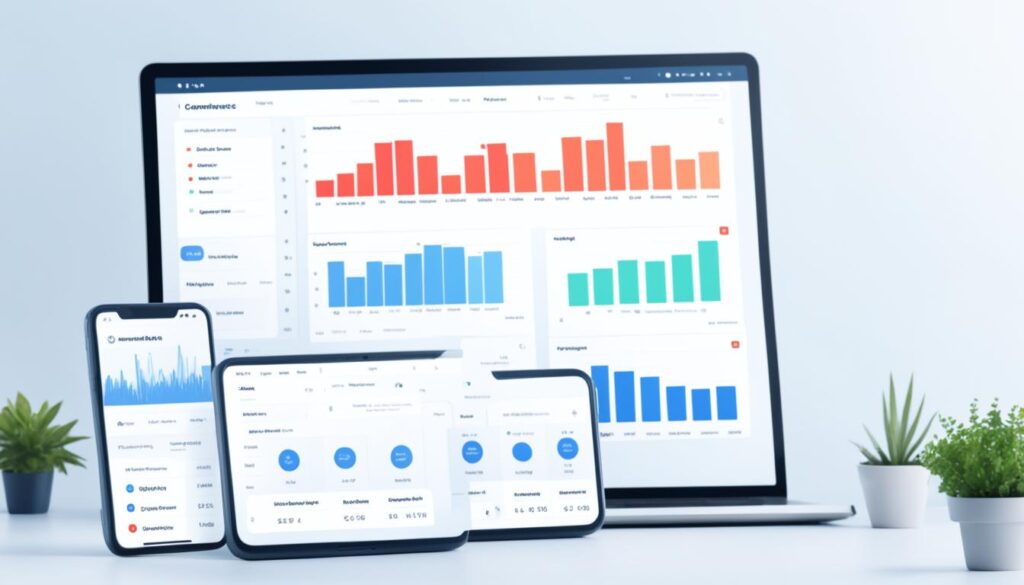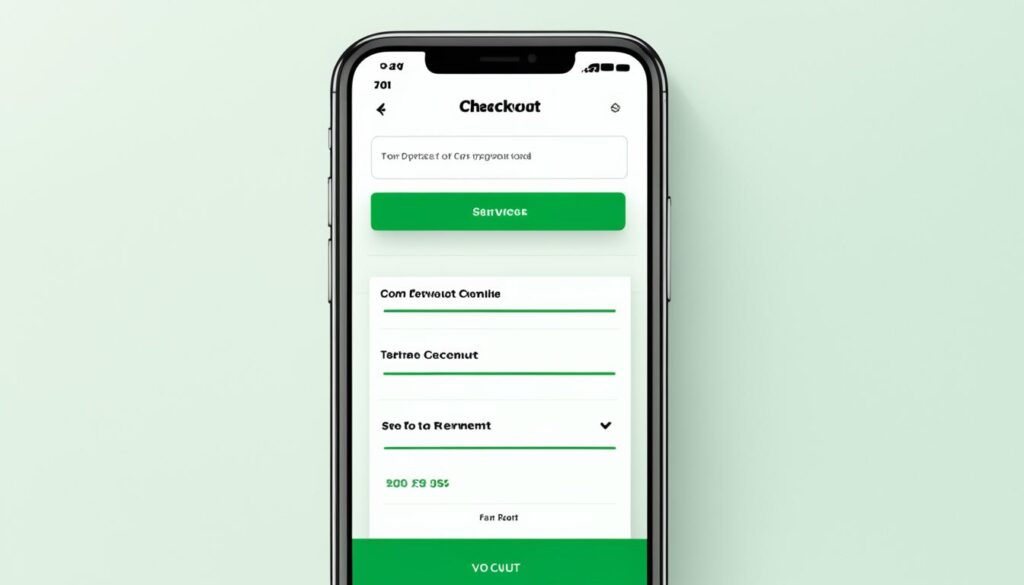Are you looking to take your e-commerce business to the next level? Look no further than Shopify Partners. As a certified Shopify partner, I can attest to the immense benefits and opportunities that come with being part of this esteemed network of experts.
Whether you need assistance with Shopify development, design, or consulting, there is a dedicated Shopify expert waiting to help you. These professionals have the knowledge and experience to optimize your online store for maximum success.
By partnering with a Shopify development agency or Shopify design experts, you gain access to exclusive resources and guidance tailored specifically to your e-commerce needs. From custom app development to marketing strategies, they have the expertise to propel your business forward.
As certified Shopify partners, our primary goal is to ensure your e-commerce venture thrives. We understand the challenges you face and are committed to providing the support and expertise you need to overcome them.
Don’t hesitate to join forces with Shopify professionals and Shopify app developers. Together, we can unlock the full potential of your e-commerce store, drive sales, and achieve long-term growth.
The Key Factors Influencing Ecommerce Sales
In the dynamic world of ecommerce, various factors influence sales. Understanding these key factors can help businesses strategize and optimize their efforts to drive success. Let’s explore the critical elements that impact ecommerce sales.
1. Market Trends
Staying up-to-date with current market trends is essential for ecommerce success. Analyzing market data and consumer behavior can provide vital insights into emerging demands, enabling businesses to align their offerings and promotions accordingly.
2. Competitor Activities
Monitoring competitor activities is crucial to gain a competitive edge. By analyzing their strategies, pricing, and product offerings, businesses can identify opportunities to differentiate themselves and attract customers.
3. Marketing Efforts
Effective marketing campaigns play a significant role in driving ecommerce sales. Deploying targeted and engaging marketing initiatives across various channels helps to increase brand awareness, attract traffic, and convert visitors into customers.
4. Seasonal Buying Patterns
Understanding seasonal buying patterns allows businesses to tailor their promotions and inventory management strategies accordingly. By leveraging the demand during peak seasons, businesses can boost sales and maximize revenue.
5. Ecommerce Store Traffic
The number of people visiting an ecommerce store is a critical factor influencing sales. High-quality traffic not only increases the chances of conversions but also enhances brand visibility and customer engagement.
6. Conversion Rate
The conversion rate is a measure of the percentage of website visitors who take the desired action, such as making a purchase. Improving the conversion rate by optimizing website design, user experience, and checkout process can significantly impact sales.
7. Average Lifetime Value of a Customer
The average lifetime value of a customer quantifies the revenue generated by an individual customer over their entire relationship with the business. By increasing customer retention and encouraging repeat purchases, businesses can enhance the lifetime value and overall revenue.
By paying attention to these key factors and continuously optimizing strategies, businesses can unlock their full potential and achieve remarkable ecommerce sales figures.

Tactics to Increase Ecommerce Sales
To boost your ecommerce sales, it’s essential to implement a variety of tactics that target different aspects of your business. From optimizing your sales funnel to leveraging the power of influencer partnerships and social media marketing, every action you take can contribute to a significant increase in revenue.
1. Improve Your Sales Funnel
Your sales funnel is the journey your customers take from the moment they discover your brand to the final purchase. By analyzing the different stages of your funnel, you can identify areas where potential customers may drop off and make necessary improvements.
Some key strategies to optimize your sales funnel include:
- Creating compelling landing pages that drive conversions
- Streamlining the checkout process to minimize cart abandonment
- Implementing retargeting campaigns to re-engage potential customers
2. Launch a Paid Ad Campaign
Paid advertising is a powerful tool to generate targeted traffic to your ecommerce store. By utilizing platforms like Google Ads, Facebook Ads, or Instagram Ads, you can reach your ideal customers and increase your chances of making a sale.
When launching a paid ad campaign, consider the following:
- Define clear objectives and target your ads to specific audiences
- Use persuasive ad copy and compelling visuals to capture attention
- Monitor and optimize your campaigns regularly to maximize ROI
3. Leverage Influencer Partnerships
Influencer marketing has become a popular way to reach and engage with your target audience. Partnering with influencers who align with your brand can expose your products to a wider audience and generate trust and credibility.
When collaborating with influencers, explore these strategies:
- Unpaid gift programs that provide influencers with your products to review
- Establish brand ambassadorships for long-term partnership and visibility
- Use unique coupon codes to incentivize purchases and track influencer-driven sales
4. Utilize Social Media Marketing
Social media is a powerful tool for promoting your ecommerce store, building brand awareness, and engaging with your audience. By creating compelling content and fostering meaningful connections, you can drive traffic and increase sales.
Consider these social media marketing strategies:
- Create engaging posts that educate, entertain, or inspire your audience
- Encourage user-generated content to foster a sense of community
- Run targeted social media ads to reach specific customer segments
5. Optimize User Experience
The user experience (UX) of your ecommerce store plays a crucial role in determining whether a visitor becomes a customer. By providing a seamless and intuitive shopping experience, you can significantly increase conversions and sales.
Improve UX by focusing on the following areas:
- Optimize website speed to reduce load times and enhance user satisfaction
- Ensure responsive design for a seamless mobile shopping experience
- Simplify navigation and make product information easily accessible
6. Offer Purchase Incentives and Start a Loyalty Program
Providing purchase incentives and establishing a loyalty program can encourage repeat purchases and foster customer loyalty. Discounts, free shipping, and exclusive perks can motivate customers to choose your store over competitors.
Consider implementing these strategies:
- Offer free shipping for a minimum order value or specific product categories
- Provide exclusive discounts or early access to new products for loyal customers
- Implement a points-based loyalty program that rewards customers for their purchases
7. Prioritize Excellent Customer Service
Exceptional customer service is crucial for driving customer satisfaction, positive reviews, and repeat business. Responding promptly to inquiries, resolving issues efficiently, and going the extra mile can help you build a loyal customer base.
Focus on the following customer service strategies:
- Offer multiple channels for customer support, including live chat, email, and phone
- Train your support team to provide knowledgeable and friendly assistance
- Solicit and act upon customer feedback to continuously improve your service

Implementing these tactics can help you increase your ecommerce sales and create a thriving online business. By continuously evaluating and optimizing your strategies, you can stay ahead of the competition and achieve long-term success.
Improving Your Sales Funnel
Optimizing your sales funnel is crucial for increasing conversions and sales. To do this, analyze your ecommerce site metrics to identify weaknesses in your sales funnel.
If you have a high conversion rate but low website visitors, focus on top-of-funnel marketing strategies. This could include implementing SEO tactics to improve your website’s visibility in search engine results or investing in paid advertising campaigns to drive more traffic to your site.
On the other hand, if you have sufficient website traffic but a low conversion rate, it may indicate issues with the online shopping experience for visitors. Take a closer look at your website design, layout, and navigation to ensure it is user-friendly and intuitive. Streamlining the checkout process and implementing trust signals, such as customer reviews and secure payment options, can also help improve the overall online shopping experience.
Ideally, you want to strike a balance between attracting a larger audience to your ecommerce site and providing a seamless online shopping experience that converts visitors into customers.
By continuously analyzing your ecommerce site metrics and making improvements based on the data, you can optimize your sales funnel and boost your conversions and sales.
Example:
| Metric | Current Value | Desired Value | Action Steps |
|---|---|---|---|
| Website Visitors | 5,000 per month | 10,000 per month | Invest in SEO and paid advertising |
| Conversion Rate | 2% | 4% | Optimize website design and checkout process |

With the right strategies in place, you can attract more website visitors and provide them with an enjoyable online shopping experience, ultimately leading to increased conversions and sales.
Launching a Paid Ad Campaign
When it comes to driving traffic to your online store, launching a paid ad campaign can be a game-changer. With the right advertising strategy, you can reach a wider audience and increase brand visibility. Let’s explore the different options available for running a paid ad campaign.
Traditional Advertising
Traditional advertising formats such as billboards, print ads, and TV commercials have been effective for decades. These channels allow you to reach a broad audience and create brand awareness. However, they may not provide the same level of targeting and flexibility as digital advertising.
Digital Advertising
Digital advertising has revolutionized the way businesses promote their products and services. It offers a range of options that can be tailored to your target audience and marketing goals. Some popular forms of digital advertising include:
- Social media ads: Platforms like Facebook, Instagram, and Twitter allow you to run targeted ad campaigns based on user demographics, interests, and behaviors.
- Display ads: These visual ads appear on websites, often in the form of banners or sidebars. They can be highly targeted and are commonly used for remarketing to previous website visitors.
- Search engine ads: With platforms like Google Ads, you can bid on keywords related to your products or services. Your ads will be displayed when users search for those keywords, making them highly relevant.
Unlike traditional advertising, digital ads provide real-time data and analytics, allowing you to measure the success of your campaigns. This data can help you make informed decisions and optimize your ad spend for the best results.

As an ecommerce business, digital advertising is particularly effective due to its targeted reach and ease of tracking sales attribution. It enables you to precisely target your desired audience and drive traffic directly to your online store, increasing the chances of conversion.
Now that we’ve explored the various options for running a paid ad campaign, it’s essential to choose the right approach based on your target audience, budget, and marketing objectives. A well-executed paid ad campaign can bring significant traffic and sales to your online store.
Partnering with Influencers
Influencer marketing is a highly effective strategy for increasing reach and boosting sales in e-commerce. Collaborating with influencers allows you to tap into their existing audience and leverage their influence to promote your products or services. There are several ways you can partner with influencers to maximize the impact of your marketing efforts.
Unpaid Gift Programs:
An unpaid gift program involves sending your products to influencers in exchange for their honest reviews or endorsements on their social media platforms or blogs. This type of partnership allows you to showcase your products to a wider audience and gain valuable social proof through the influencers’ recommendations.
Brand Ambassadorships:
Establishing long-term brand ambassadorships with influencers can significantly enhance your brand’s visibility and credibility. By collaborating with influencers who genuinely align with your brand values and target audience, you can build strong relationships and benefit from their ongoing endorsements and content creation activities.
Influencer-Generated Coupon Codes:
Distributing coupon codes through influencers is an effective way to incentivize purchases and drive sales. Offering exclusive discount codes or promotional offers encourages influencers’ followers to make a purchase, making it a win-win for both your brand and the influencer.
When partnering with influencers, it’s crucial to find the right fit for your brand. Look for influencers who have an engaged and relevant audience, align with your values, and have a genuine interest in your products or services. Building authentic relationships with influencers will not only maximize your reach but also enhance your brand’s reputation and credibility.

| Benefits of Partnering with Influencers |
|---|
| Increased brand visibility and reach |
| Access to a highly engaged target audience |
| Authentic and trusted recommendations |
| Influencer-generated content and user-generated content |
| Incentivized purchases through coupon codes |
Utilizing Social Media Marketing
In today’s digital landscape, social media marketing plays a crucial role in promoting your e-commerce business. It offers a multitude of benefits, including increasing brand awareness, educating your audience about your products, driving traffic to your online store, and enhancing customer retention and repeat purchases.
When implementing social media marketing strategies, it’s essential to identify the social media platforms where your target customers are most active. By doing so, you can focus your efforts on the platforms that will yield the highest return on investment.
One effective way to maximize the impact of your social media marketing is by utilizing social media management tools. These tools allow you to schedule quality content, engage with your audience, and track the performance of your campaigns. They help streamline your social media efforts and ensure consistency and efficiency in your marketing initiatives.
By leveraging social media marketing, you can achieve the following:
- Brand Awareness: Successfully establish and enhance your brand’s presence on social media platforms, reaching a wider audience and increasing brand recognition.
- Audience Education: Educate your target audience about your products or services, highlighting their unique selling points and benefits.
- Click-throughs: Drive traffic to your e-commerce website through strategically placed call-to-action buttons and compelling content that entices users to click.
- Customer Retention: Build and maintain relationships with your existing customer base by nurturing engagement, offering exclusive promotions, and providing valuable content.

Remember, social media marketing is not a one-size-fits-all approach. Each platform requires a tailored strategy to maximize its potential. Through consistent effort and thoughtful planning, your social media marketing efforts can yield significant results, contributing to the growth and success of your e-commerce business.
Enhancing User Experience on Your Ecommerce Site
Improving the user experience on your ecommerce site is crucial for increasing conversions. When visitors have a positive experience, they are more likely to stay on your site, explore your products, and make a purchase. Here are some key areas to focus on:
- Design and Branding: Ensure that your online store accurately represents your brand and creates a visually appealing and cohesive experience for your customers. Consistent branding elements such as colors, fonts, and imagery across your website help build trust and familiarity.
- Product Pages: Optimize your product pages to showcase your offerings effectively. Use high-quality images that accurately represent your products, and provide clear and concise product descriptions. Include relevant information such as features, specifications, and pricing details.
- Checkout Process: Streamline the checkout process to make it quick and intuitive for customers. Avoid asking for unnecessary information and provide multiple payment options for convenience. Display a progress indicator to let customers know how many steps are remaining, reducing cart abandonment.
- Mobile Display: With the increasing use of mobile devices for online shopping, it is essential to have a responsive design that adapts seamlessly to different screen sizes. Test your website’s performance on mobile devices to ensure optimal user experience.
- Ecommerce Platform: Consider using a robust ecommerce platform like Shopify to simplify the management of your online store. Shopify offers a user-friendly interface, a variety of customizable themes, and built-in features to optimize user experience.
Remember, a well-designed and user-friendly ecommerce site enhances trust, encourages engagement, and ultimately drives conversions. By prioritizing the user experience, you can create a seamless online shopping journey for your customers.
Example: Mobile-Optimized Checkout Process
| Before Optimization | After Optimization |
|---|---|
 |
 |
Conclusion
Becoming a Shopify Partner is a smart move for anyone looking to achieve e-commerce success. As a Shopify Partner, you not only gain access to expert guidance and exclusive resources, but you also become a part of a supportive community that understands the challenges and opportunities of the e-commerce industry.
The Shopify network is filled with Shopify experts who have the knowledge and experience to help you optimize your online store for maximum performance. Whether it’s improving your website design, enhancing your user experience, or implementing effective marketing strategies, Shopify experts can provide you with valuable insights and strategies to drive sales and grow your business.
By partnering with Shopify, you can leverage their expertise and tools to make continuous improvements to your store. Shopify’s intuitive platform and robust features make it easy for you to manage and scale your business, while their ongoing support ensures that you’re never alone on your e-commerce journey.
Don’t miss out on the opportunity to join the Shopify network and take your e-commerce business to new heights. With the help of Shopify experts and partners, you can achieve your goals, increase sales, and create a thriving online store that stands out in the competitive e-commerce landscape.




